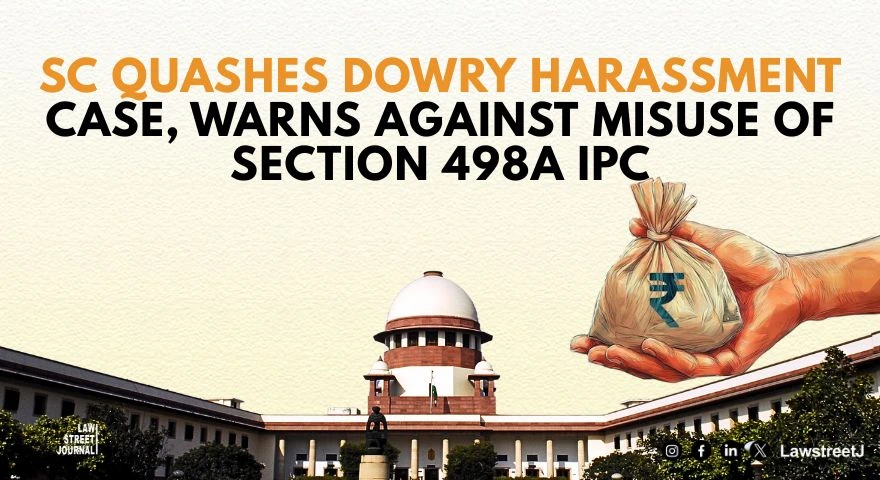New Delhi: The Supreme Court has quashed a dowry harassment case against a brother-in-law, emphasizing that matrimonial disputes must be scrutinized with great care and warning against misuse of Section 498A IPC as a tool for personal vendetta in family conflicts.
Justices B.V. Nagarathna and R. Mahadevan delivered strong observations on the need to prevent abuse of legal processes in matrimonial cases while cautioning against vague and omnibus allegations lacking specific details.
The court addressed a criminal appeal arising from SLP (Criminal) No. 4069 of 2024 filed by Shobhit Kumar Mittal, challenging the Allahabad High Court’s refusal to quash FIR No. 347 of 2023. The court noted, “This appeal arises out of the order dated 27.02.2024 passed by the High Court of Judicature at Allahabad in Criminal Miscellaneous Writ Petition No. 2676 of 2024 dismissing the application filed under Article 226 of the Constitution.”
The case stemmed from an FIR filed by Jyoti Garg against her husband Mohit Mittal, mother-in-law Shashi Mittal, and brother-in-law Shobhit Kumar Mittal under Sections 323 and 498A IPC and Sections 3 and 4 of the Dowry Prohibition Act. The complainant alleged harassment for dowry and claimed that due to repeated harassment, “a vein of the complainant in the brain burst and consequently her right hand and right leg got paralyzed.”
The court found the allegations fundamentally flawed and lacking specificity: “A bare perusal of the FIR shows that the allegations made by complainant/respondent No.2 are vague and omnibus. Other than claiming that the husband and his family along with the accused/appellant herein mentally harassed her with a demand for dowry, the complainant/respondent No.2 has not provided any specific details.”
The court was particularly critical of the absence of concrete evidence linking the alleged harassment to the medical condition. It observed, “Furthermore, the complainant/respondent No.2 has failed to impress the Court as to how the alleged harassment has any proximate relationship to the said injury and nerve damage that she sustained, so as to implicate her in-laws under Section 323 IPC.”
The bench further emphasized that criminal proceedings require specific allegations rather than general accusations, noting: “In such cases involving allegations of cruelty and harassment, there would normally be a series of offending acts, which would be required to be spelt out by the complainant against perpetrators in specific terms to initiate criminal proceedings against them.”
The court also expressed serious concern about misuse of Section 498A in matrimonial disputes, citing its recent judgment in Dara Lakshmi Narayana vs. State of Bihar. The judgment observed: “There has been a growing tendency to misuse provisions like Section 498A of the IPC as a tool for unleashing personal vendetta against the husband and his family by a wife.”
The Court warned against the tendency to implicate all family members without specific allegations. Justice Nagarathna stated: “A mere reference to the names of family members in a criminal case arising out of a matrimonial dispute, without specific allegations indicating their active involvement, should be nipped in the bud.”
The court noted the broader implications of such misuse, observing: “Making vague and generalised allegations during matrimonial conflicts, if not scrutinized, will lead to misuse of legal processes and an encouragement for use of arm-twisting tactics by a wife and/or her family.”
While acknowledging the protective purpose of Section 498A, the court balanced this against preventing its abuse. The judgment stated: “We are not, for a moment, stating that any woman who has suffered cruelty in terms of what has been contemplated under Section 498A of the IPC should remain silent and forbear herself from making a complaint.”
However, the court emphasized the need for judicial vigilance: “The insertion of the said provision is meant mainly for the protection of a woman who is subjected to cruelty in the matrimonial home primarily due to an unlawful demand for any property or valuable security in the form of dowry. However, sometimes it is misused, as in the present case.”
The court applied the principles laid down in State of Haryana vs. Bhajan Lal, finding that the allegations, even if taken at face value, did not constitute the offenses charged. It concluded: “It is neither expedient nor in the interest of justice to permit the present prosecution emanating from the FIR to continue.”
Case Title: Shobhit Kumar Mittal vs. State of Uttar Pradesh & Another













